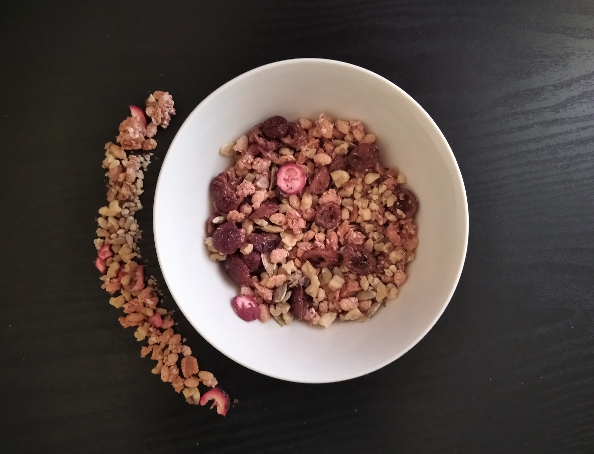Development of novel short meals (snacks) for functional modulation of gut microbiota in Type-1 Diabetes
| Technology code 21-DUTH-01 |
Status OPEN |
Applications mode First call for expression of interest |
Access model As specified in the call |
Code: 21-DUTH-01
The Opportunity
Due to the modern lifestyle needs, consumer demand for nutritional-enhanced and health-promoting short and quick meals (snacks) with an impact on functional modulation of gut microbiota in Type-1 Diabetes is steadily growing.
Our Offer
During the last decades, the incidence of Type 1 diabetes (T1D) has dramatically increased in developed countries, suggesting that beyond the genetic component, environmental factors, such as diet, intestinal microbiota, increased pharmaceutical use and chemical exposure contribute to the onset and the development of the disease. T1D is characterized by a series of events, resulting in autoimmune destruction of the insulin-secreting pancreatic β-cells and inability of the body to regulate and use blood glucose.
The gastrointestinal (GI) tract constitutes the most important site of interaction between the host immune system and microorganisms. Gut microbes exert both anti- and pro-inflammatory actions, since normal flora community includes members that are capable to induce inflammatory responses. Thus, the intestinal microbiota is a major contributor towards the onset of T1D and/or is also modified as a result of T1D disease progression.
The restoration of normal composition of microbiota populations constitutes a new target for the prevention and treatment of the T1D. Diet is a major environmental factor contributing to gut microbiota diversity and functionality, as different dietary compositions have diverse effects on bacterial shifts. Hence, consumption of prebiotic fibers along with health-promoting microbial species (probiotics) has been associated with glucose intolerance, immune responses and intestinal microbiota regulation. Our technology includes fortification of prebiotic dietary fibers with functional microbial cultures that have been previously documented in modulating gut microbiota in Type-1 Diabetic patients.
The Technology
The principle of this technology is based on the development of structured delivery assemblies to protect the functional cultures against various harsh degradative conditions during food production, storage and digestion.
A properly designed strategy for incorporation of functional cultures into foods (formulation strategies, processing, stability and organoleptic quality issues) is a key factor in the development of functional products. Although encapsulation technologies have largely been exploited in the pharmaceutical (e.g. drug and vaccine delivery) and agricultural/agro-industrial industry (e.g. fertilizers), the food industry has only recently become aware of the immense benefits that these technologies can offer. Incorporating functional microbes (probiotics) into a food matrix presents a fully new challenge, not only because of their interactions with other constituents, but also because of the severe conditions often employed during food processing and storage, as well as during the GI transit until they reach the desired site in the body. These severe conditions might lead to important losses in viability, as probiotics are thermally labile (on heating and/or freezing), sensitive to acidity, oxygen or to other food constituents (e.g. salts). To overcome this deficiency, cell immobilization has been proposed to maintain the probiotics in their active and functional form, ensuring thus that they reach the desired site of the GI without modifications but intactly. Therefore, the challenge for food manufacturers is to develop effective protective delivery systems for probiotics without adversely affecting the sensorial quality and/or the shelf-life of the fortified products.
Our idea was to develop a commercial healthy and nutritional snack product by enriching prebiotic dietary fibers with beneficial microorganisms tailored to functional modulation of gut microbiota in T1D.
Advantages & Innovations
The proposed technology aims at marketable "ready-to-eat" snack products consisting of prebiotic dietary fibers fortified with health-promoting microbes and is expected to provide superior-quality and nutritious short meal alternatives with a high commercialization potential.
- No need for extensive equipment and precision
- High customer market
- Economically viable investment
- High nutritional product
- Short meal alternative
Stage of Development
This novel technology is an innovative process validated in a lab environment. The next step requires an industrial setting validation and production in order to ensure the effectiveness of the process in large-scale manufacturing.
Partner Search
FOOD INNOVATION RI is seeking for Partners with the capacities to develop this technology. The ideal Partner shall be a food manufacturing company with a strong retail network or a food ingredient producer eager to further develop this technology in a relevant and operational environment. Alternative options may also be considered.
Offered by
Department of Agricultural Development, Democritus University of Thrace, 193 Pandazidou Str, 68200 Orestiada, Greece
Contact

Prof Eugenia BEZIRTZOGLOU
This email address is being protected from spambots. You need JavaScript enabled to view it.
Microbiology


